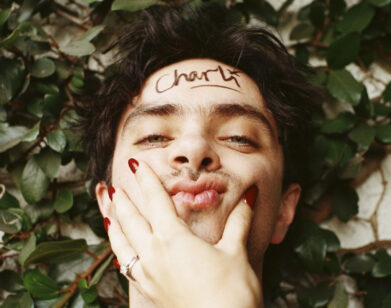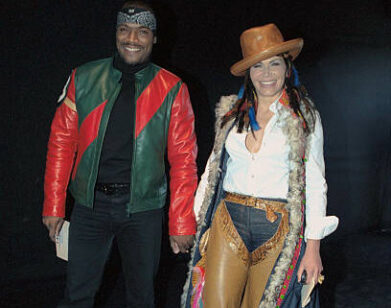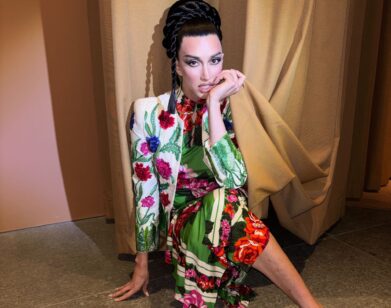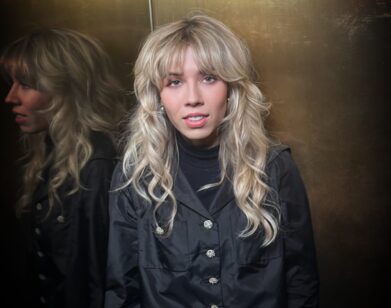Mireille Enos and the End of Sarah Linden
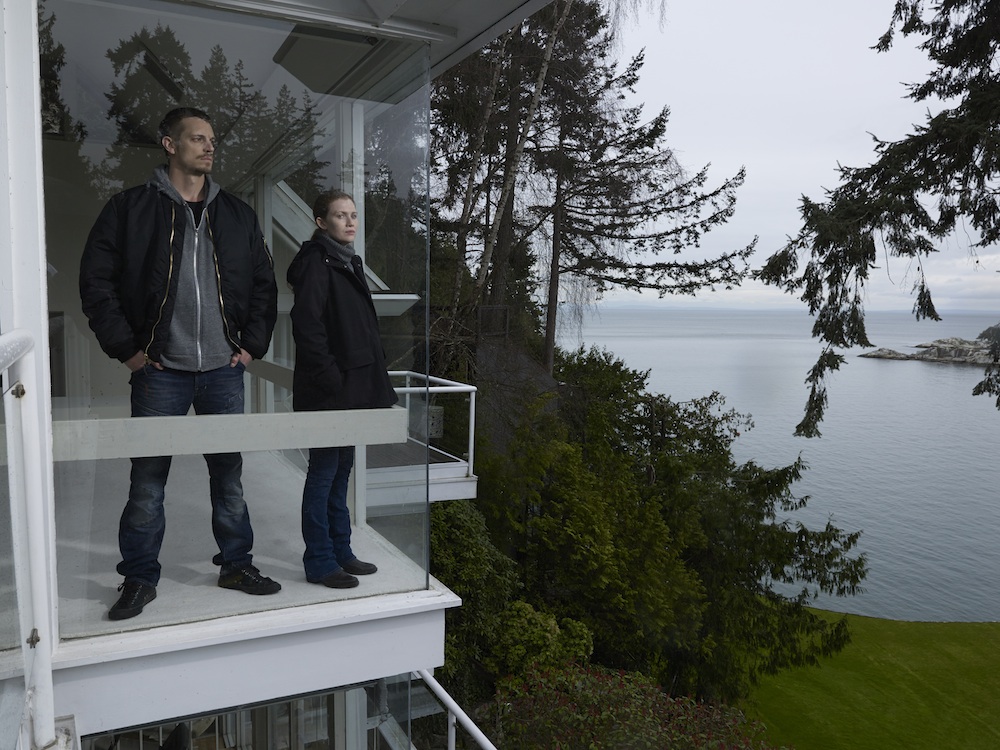
ABOVE: JOEL KINNAMAN AND MIREILLE ENOS IN THE KILLING. PHOTO COURTESY OF FRANK OCKENFELS/ NETFLIX.
There is a great deal to resolve in the final episodes of The Killing. Season Three ended on a cliff hanger, to say the least, with police officers Sarah Linden and Stephen Holder agreeing to cover up the murder of their former, serial-killer-on-the-side boss. It would have been left at this—AMC cancelled the show for the second time after the season finale—but Netflix came to the rescue. “When AMC came back after the cancellation of the second season, we all assumed we would have at least two more,” explains Mireille Enos, who plays Linden. “I felt so because we left Sarah in such a terrible predicament. It felt bad that that would be her legacy, standing alone in those woods.”
At the beginning of the six-episode Season Four, however, Sarah is still sinking. Holder, played by Swedish-American actor Joel Kinnaman, offers her no solace; he too is teetering towards new lows. If the aftermath of Season Three wasn’t enough, a new cast of characters is introduced as the two detectives investigate the mass murder of a wealthy Seattle family. Among them is Joan Allen, who plays a straitlaced, but ultimately compassionate army Colonel in charge of an all-boys school, and Tyler Ross as Kyle, the traumatized, sole-survivor of the shooting. “[This season] is so much about Sarah’s personal journey,” says Enos. “Her personal denouement—the resolution of the choice she made—was so powerful.”
Acting has always been Enos’ goal—she cannot remember “wanting to be anything else. I have a brother who is 11 years older than me and he was really involved in theater in high school and college,” she tells us over the phone. “I remember watching him do it from a very, very young age, and it always just seemed so magical. I just kept putting one foot in front of the other and there was never anything else.” The greatest advice she’s received over the years, she says, is that “any actor in their most raw form, is more interesting than anything you can fabricate, and that you have to be willing to bring yourself.”
Before The Killing, the Texas-raised actress appeared in one-off episodes of the requisite shows: CSI, Law & Order, Without a Trace. Her biggest credit was playing twin sisters on HBO’s Mormon-drama Big Love (funnily enough, Enos was herself raised Mormon). “The role was just the right size,” she recalls. “It was very mature, it was a great character, but it wasn’t so big that it was overwhelming… There’s no question in my mind that doing Big Love led directly to getting The Killing.”
In turn The Killing, which premiered in 2011, led to high-profile roles for Enos in commercial films (Gangster Squad, World War Z, Sabotage) opposite very famous names (Brad Pitt, Josh Brolin, Reese Witherspoon). At the end of August, she’ll play Chloë Grace Moretz’s mother in the teen weepie, If I Stay. “It’s beautiful,” Enos comments happily.
EMMA BROWN: What do you think Sarah’s best and worst qualities are?
MIREILLE ENOS: I actually think her best and worst qualities are the same—it’s just how far she pushes it. Her dedication to her work and her stubbornness are wonderful qualities. But then she pushes it too far, and she puts herself at risk, and her health, and that’s the worst side of herself. Also her unwillingness to give up—when you think about her as a mother, which is definitely a very difficult aspect of her life, she keeps trying. She keeps showing up and trying to do better. There’s this wonderful quote that I love, which is, “Try again, fail again, fail better,” and I think that really describes Sarah.
BROWN: Do you think that she likes herself?
ENOS: I don’t think she always does like herself. Particularly in this season she’s having a hard time liking herself; there’s a lot of self-loathing going on. I think she likes herself better than she likes a lot of other people, but she has a hard time with herself, and especially after making that horrible choice.
BROWN: In previous seasons, Linden and Holder have held each other up. In this season they seem to be bringing each other down. Do you feel like they help or hinder each other?
ENOS: Mostly they help each other. They’re both pretty broken people and they just happen to be broken in different ways and that has benefited them. They’ve been able to balance one another out. Holding this kind of a secret is so toxic, and it moves their relationship into a new arena of intimacy and it also opens the door for them to wound each other more than ever. I don’t think they’re very good for each other this year.
BROWN: Are you someone who is good at keeping secrets?
ENOS: I try not to have secrets. Definitely something that we play with in the show, and something that I believe, too, is that you’re as sick as your secrets. The more open you’re able to be, the more you’re able to share even the most uncomfortable aspects of yourself, the healthier you’ll be.
BROWN: There’s a moment in Season Four when Sarah says to her former social worker, “You don’t even know who I am,” and her former social worker replies, “Nobody knows who you are, and that’s the problem.” Do you feel like anybody knows who Sarah is in the show?
ENOS: I think Holder comes the closest.
BROWN: When you started filming Season Three, did you know who the killer was going to be?
ENOS: No. I had no idea. I actually figured it out when I got the script for Episode 11: Sarah’s running in the woods, she has her moment with the tree, and then she arrives home and Skinner is sitting on Sarah’s front porch. At that moment I figured it out, and I sent [showrunner] Veena [Sud] a text saying, “Am I right?” And she wrote back, “Hahahaha.” I didn’t know, [but] I figured it out before Elias Koteas did—he didn’t know until he read the script where it’s revealed. He was so sad. He was really heartbroken. It was very sweet.
BROWN: Did you have a theory about whom it could be before you found out?
ENOS: No, I really didn’t. I was baffled. We were setting up the red herring that it was Reddick. I never really believed that it was him because there’s always a final twist. But I really didn’t know. Veena tends to like to do the most horrible thing possible, so I had started to wonder and then I knew for sure once I saw Skinner sitting on my porch.
BROWN: I read that Joel Kinnaman was very excited about being allowed to say “fuck” in Season Four, because you were on Netflix instead of AMC.
ENOS: Yeah, that is true. We had boundaries across language because it was cable. I don’t think it hindered the show at all for the first seasons, but we just had more liberty this year and Joel definitely likes to be as genuine as possible so he enjoyed that.
BROWN: How did you originally get cast as Sarah? Did you have to fight for the past?
ENOS: Yeah, I did. I went in—I knew the casting directors, Junie [Lowry-Johnson] and Libby [Goldstein], because they cast me in Big Love. We had a very warm relationship, and they thought of me right away for this. But it was the first female lead on AMC; they were going to audition every potential actress in the world. It was definitely a long shot, but they were super supportive of me. I came in and I auditioned, and I had prepared two scenes, and then they asked me to prepare another two just right then outside. I came in for a callback with those four scenes, and then again they sent me out and asked me to do two more. [I got] emails from [director] Patty Jenkins with wonderfully positive notes and supportive emails from casting. Then they said, “We’re going to go about our process, but just know you’re high on the list.” Well, that turned into six weeks of silence, and so I finally threw away all of my sides and erased the emails. I thought, “I have to walk away from the hope of this” even though it kind of felt like lightning struck when I read it. There was just this strange feeling like it could be mine, it should be mine, which doesn’t always happen when you read something. I felt really connected to it. I was on a little trip to New York with my husband and I had a big pilot season and nothing had come through. I said to him, “Look, I just have to ask you, are you at all worried that I auditioned for 40 things and nothing happened and now I’m pregnant with our daughter and I’m probably never going to have work again?” I started weeping. [laughs] The next day, my manager called and said, “The Killing wants you back.”
BROWN: What did your husband say? “Yes, I am very worried”?
ENOS: No! He said, “No, honey, I’m not worried at all. You’re right where you need to be, your feedback is always great, don’t worry, don’t worry,” which was lovely. One day can change everything, and they called me back in. I auditioned a third time. They asked me to test. The test was an hour and a half long—grueling—and then they made me wait for a full week before they told me. It was a long process.
BROWN: Did you grow up watching murder mysteries?
ENOS: Not really. I recently did an interview where they wanted to know if I had read any mystery genre stuff, and I was so completely baffled, the only one that I could come up with, which was very silly, was when I was nine years old, I read a book called Bunnicula. It was a mystery about a vampire rabbit. [laughs] But I don’t know that that really counts.
BROWN: Well, it stuck with you.
ENOS: Yeah, it really did. I read it three or four times. I would laugh and laugh and laugh. It was great.
BROWN: I was looking through all the projects you’ve done, and I noticed you were in the same episode of Sex and the City as Justin Theroux.
ENOS: Yes, that’s right! [laughs] That was my first TV job in New York City. That was my first anything job in New York City. I had one line. It was a big family brunch scene and I was the lesbian girlfriend of the sister of Justin Theroux, who Sarah Jessica Parker was dating. His mother asked me how my food was and I said, “It’s very good,” and that’s all I said the whole episode. But I was a grumpy, pretty lesbian girl.
BROWN: Were you overcome with a feeling of, “Yes! I’ve made it!”?
ENOS: I was, actually! Because it was the first audition that I went on with a new agent who was kind of testing me out. He had said mostly it would just be commercial auditions and occasionally a one-line thing, and so this audition came up—it was my very first audition—and I booked it. That felt thrilling. I thought [the show] was great. Those girls were really ballsy and wonderful.
BROWN: Did you do commercials as well?
ENOS: I never really booked any commercials. I think I did one for carpets, but I don’t remember what brand. That door never really opened up.
BROWN: In the past you’ve mentioned that you’d like to do something your children can see before they are 18.
ENOS: [laughs] Yes. But I have done it now! I have a sweet movie coming out in August called If I Stay.
BROWN: Really? That won’t make them cry?
ENOS: It will. It will make them cry. But at least the content is acceptable.
BROWN: What’s the last movie that made you cry?
ENOS: If I Stay, actually. I got to watch a screening of it and I was a big baby. I cried all the way through.
BROWN: Are you able to watch a movie that you’re in as if you weren’t in it?
ENOS: Most of the time, yes. At the beginning of my TV and movie stuff, I would be really critical of myself, but I’ve gotten better and better. There’s always little things that I think, “Oh, that could have been whatever,” but most of the time I’m able to let go and watch like an audience member.
ALL SIX EPISODES OF THE KILLING SEASON FOUR WILL BE AVAILABLE VIA NETFLIX FROM TOMORROW, AUGUST 1.


